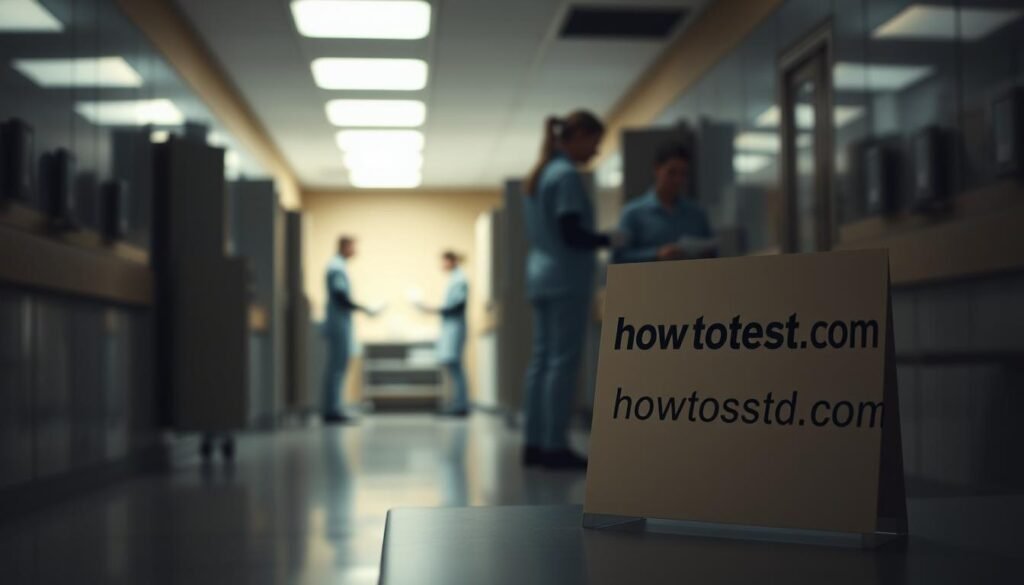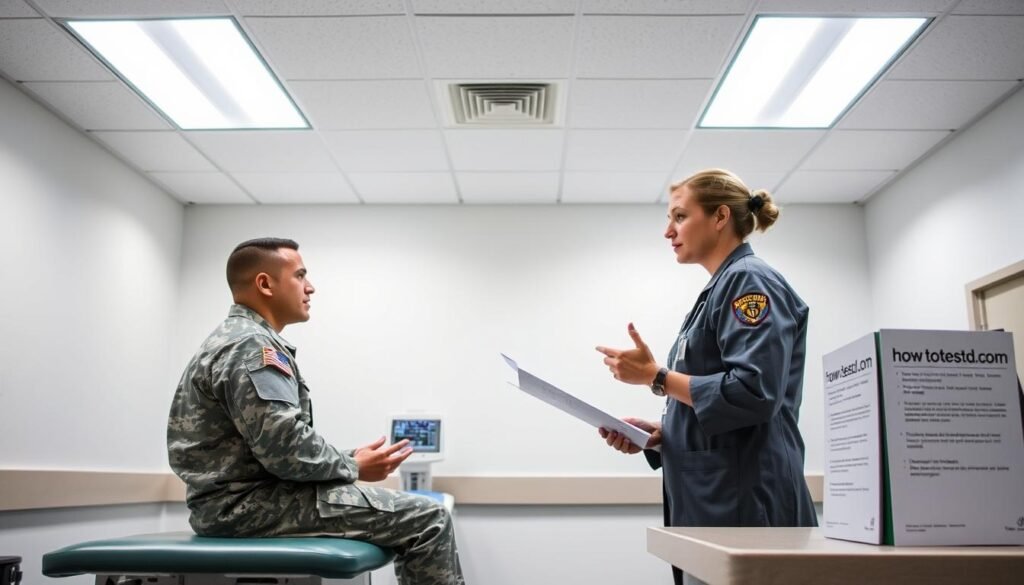Get Tested: STD Testing for Military Personnel
Military people can get sexually transmitted diseases (STDs). Some groups in the military get STDs more often than others. This is bad for their health and the military’s work.
It’s important for military folks to take care of their health. They should get confidential STD tests often. This helps keep them healthy and ready for work.
Key Takeaways
- Regular STD testing is key for military people.
- Confidential STD testing services are there.
- Staying healthy helps the military do better.
- STD tests are important for health and happiness.
- Military folks can get special testing.
The Critical Role of Sexual Health in Military Readiness
Keeping sexual health in check is key for military readiness. STDs can really hurt a soldier’s ability to do their job well. A study on the National Center for Biotechnology Information shows military folks face special risks for STDs.
Unique Risk Factors in Military Environments
Military life has its own risks for STDs. Things like being away from home, meeting new people, and moving around a lot can raise the risk. “The military lifestyle can sometimes lead to risky sexual behaviors,” says the need for military STI screening programs. It’s important to make sure soldiers can get STD screening for soldiers easily.
How Untreated STDs Impact Operational Effectiveness
STDs can really hurt a soldier’s ability to work well. They might need to take time off for treatment, face health problems later, and even spread the disease. Regular military health clinic STD testing helps catch and treat STDs fast. This keeps soldiers healthy and ready to work.
STD Testing for Military Personnel: Services and Accessibility
Military people can get many STD testing services. These services follow special rules set by the Department of Defense. Knowing about these services and rules is key to keeping military people healthy and ready.
Department of Defense STD Testing Policies
The Department of Defense has rules for STD testing in the military. These rules say it’s very important to test for STDs often. This is true for those who are at high risk or might have been exposed.
As the Department of Defense says, “STD testing is a critical part of preventive healthcare for service members.”
“The military’s approach to STD testing is proactive, aiming to identify and treat infections early to prevent long-term health consequences and maintain unit readiness.”
When to Seek Testing: Symptoms and Exposure
Service members should get tested if they have symptoms like unusual discharge or pain when they pee. They should also get tested if they think they might have been exposed to an STD. Finding infections early is important for treatment and stopping them from spreading.
Proactive Testing Schedules for Service Members
The Department of Defense suggests regular STD testing for service members. This is important for those who are at high risk or have had STDs before. Testing often helps keep sexual health good and stops infections from spreading in the military.
Regular STD testing is not just a health measure; it’s a readiness measure. It’s very important for service members to be healthy and not have STDs. This helps the military work well.
Military STD Testing Locations and Options
It’s important for service members to know where to get STD testing. The military has many testing services. This helps keep everyone healthy.
On-Base Medical Facilities and Health Clinics
On-base clinics are where military people go for STD tests. They offer many services, like screenings and tests for infections. You don’t need a doctor’s note to go, making it easy to get tested.
Benefits of on-base testing include:
- Confidentiality and privacy
- Comprehensive care and counseling
- Easy access without the need for external referrals
TRICARE Coverage for STI Screening
TRICARE covers STI screenings for military and their families. This means you can get tested for many infections without extra costs. It’s a big help in keeping everyone healthy.
“TRICARE’s coverage for STI screenings is key to keeping our military healthy.”
Off-Base and Deployment Testing Resources
Even when you’re not on base, you can get tested. The military works with many healthcare providers. Some states also offer anonymous testing.
| Testing Location | Features | Benefits |
|---|---|---|
| On-Base Clinics | Routine screenings, diagnostic testing | Convenient, confidential |
| TRICARE Providers | Covered screenings, various STIs | No additional cost, complete care |
| Off-Base/Deployment | Partnered healthcare providers, labs | Accessible in remote places, flexible options |
In summary, the military has many places and ways to get STD tests. This helps keep everyone healthy and ready. Whether you’re on base, using TRICARE, or in a deployed area, there’s help available.
Confidential STD Testing in Military Settings
Confidential STD testing is available for military service members. It ensures their privacy. The military knows how important privacy is in STD testing.

Understanding Military Medical Privacy Protections
The military has strict rules to protect service members’ health info. These rules help build trust between service members and doctors. They make sure service members feel safe when they get STD testing.
Reporting Requirements and Command Notification
Even though privacy is key, there are rules to follow. Some STD cases must be told to the command. But, the details of the diagnosis stay private. It’s important for service members to know these rules.
Anonymous Testing Options for Service Members
Some military places offer anonymous testing options. This means your identity is not recorded. You can ask about these at your local health clinic.
Service members should use these testing options to stay healthy. Knowing about privacy and rules helps them make good health choices.
The STD Screening Process for Armed Forces Personnel
The STD screening for soldiers has many steps. These steps help get accurate results and keep things private. It’s key to keep the military healthy and ready.
Pre-Testing Preparation Guidelines
Before the test, soldiers should know what it’s about. They should follow any special instructions from doctors. They might need to stop taking some medicines or avoid certain activities.
It’s good to ask doctors questions. This can help feel less worried.
What Happens During Different Types of Tests
There are many tests, like blood tests and physical checks. Blood tests find infections like HIV and syphilis. Physical checks look for signs of STDs.
Blood Tests and Laboratory Procedures
Blood tests take a sample of blood. This sample goes to a lab for testing. The lab makes sure STDs are found correctly. This helps decide how to treat the person.
Physical Examinations and Sample Collection
During physical checks, doctors might take more samples. They do this carefully and with respect for privacy.
Timeline for Results and Follow-up Procedures
How long it takes to get results varies. It’s usually a few days to a week. Service members get their results privately. Then, they get help and advice if needed.
| Test Type | Typical Turnaround Time | Follow-up Actions |
|---|---|---|
| Blood Tests | 3-7 days | Counseling, Treatment |
| Physical Examinations | Immediate | Further Testing, Treatment |
| Laboratory Tests | 5-10 days | Notification, Counseling |
Common STIs in Military Populations and Detection Methods
It’s very important to find STIs in the military. This is because the health and readiness of everyone is key. Military life can make STIs spread more easily. So, knowing the common STIs and how to find them is very important.
High-Prevalence Infections Among Service Members
Chlamydia and gonorrhea are big problems in the military. If not caught and treated, these infections can harm health and readiness.
Because of this, regular and accurate tests are very important. Chlamydia is a big worry, so testing often and teaching about safe sex is key.
Testing Technologies and Accuracy Rates
New testing tech has made finding STIs better. Nucleic acid amplification tests (NAATs) are very good at finding infections like chlamydia and gonorrhea. They work well with urine or swabs.
| STI | Testing Method | Accuracy Rate |
|---|---|---|
| Chlamydia | NAAT | 95-99% |
| Gonorrhea | NAAT | 90-95% |
| Syphilis | Serological Tests | 80-90% |
The table shows how to test for STIs and how well these tests work. NAATs are very good at finding chlamydia and gonorrhea. Serological tests are used for syphilis.

It’s very important to know about STIs in the military and how to find them. Regular tests with new tech are key to keeping everyone healthy and ready.
Military STD Prevention and Risk Reduction
Military STD prevention is a big job. It includes teaching, giving resources, and talking openly. The military knows keeping health and readiness is key.
Education and Training Programs for Service Members
The military teaches service members about STDs. They learn about safe sex, using condoms, and the dangers of drugs. This helps lower STD rates and builds a healthy culture.
Key parts of these programs are:
- Workshops and seminars on sexual health
- Distribution of informational materials on STD prevention
- Online resources and training modules
Access to Prevention Resources and Supplies
Getting to prevention tools is important. Service members get free or cheap condoms and other safety items. They also get STI tests and advice at health clinics.
| Prevention Resource | Description | Availability |
|---|---|---|
| Condoms | Free or low-cost condoms for safe sexual practices | Military healthcare facilities and online |
| STI Testing | Comprehensive STI testing services | Military healthcare facilities |
| Counseling Services | Confidential counseling on sexual health and STD prevention | Military healthcare facilities |
Communication Strategies with Partners
Talking openly with partners is key to avoiding STDs. The military pushes for honest talks about health and protection. This builds respect and responsibility.
Good tips for talking include:
- Discussing sexual history and STD status
- Agreeing on the use of protection
- Regularly getting tested for STDs
Post-Diagnosis Protocol for Military Personnel
Getting an STD diagnosis is tough for military folks. But knowing what to do next helps a lot. It’s key to stay healthy and ready for duty.
Treatment Options Through Military Healthcare
Military health offers many ways to treat STDs. TRICARE pays for treatments like meds and counseling. You can get help at base clinics or from approved doctors.
It’s important to stick to your treatment plan. This makes sure the infection goes away.
Impact on Deployment and Duty Status
An STD can change your deployment plans. The type of STD and treatment needed might limit your duties. Talk to your commander and doctor about how it affects your job.
In some cases, you might need to change your duties.
Ongoing Monitoring and Follow-up Requirements
Keeping up with check-ups is vital for managing STDs in the military. You’ll need to follow a follow-up testing schedule. This makes sure you’re cured and won’t spread it.
Check-ups also watch for any problems. How often you need to go depends on your STD and treatment.
Here are key aspects of the follow-up process:
- Regular check-ups with a healthcare provider
- Adherence to prescribed treatment plans
- Notification of sexual partners as required
Conclusion: Safeguarding Your Health Through Proactive STD Testing
Getting tested for STDs is key for military health. Regular tests help keep service members healthy and ready. Knowing the value of STD tests helps them stay in top shape.
There’s confidential STD testing in the military. It’s a safe way for service members to check their health. This testing is important for keeping everyone healthy.
By focusing on STD testing, military folks can keep their health strong. This helps them stay ready to serve. It’s all about being proactive for their health and the military’s success.
FAQ
What is the importance of STD testing for military personnel?
STD testing is key for military health. It keeps them ready for duty. Untreated STDs can cause serious health problems.
How often should military personnel get tested for STDs?
The Department of Defense suggests regular STD tests. This is after risk exposures or during check-ups. Testing schedules depend on risk and duty.
Where can military personnel get tested for STDs?
They can test at on-base clinics or through TRICARE. There are also options for off-base and deployment testing.
Is STD testing confidential for military personnel?
Yes, their medical privacy is protected. But, there are times when commands need to know. Anonymous tests might be available too.
What happens during the STD screening process?
The process starts with preparation. Then, tests are done based on the STD. After, results are given and follow-up care is planned.
What are the common STIs found in military populations?
Common STIs include chlamydia, gonorrhea, syphilis, and HIV. Accurate tests are key to finding and treating these infections.
How can military personnel prevent STDs?
Prevention includes education and training. They also have access to condoms and should talk about STDs with partners.
What happens after being diagnosed with an STD in the military?
After diagnosis, treatment is provided through military healthcare. This might affect deployment and duty status. Ongoing monitoring is required.
Are there specific guidelines for STI screening under TRICARE coverage?
Yes, TRICARE covers STI screening. There are rules for what’s covered and how to get these services.
Can military personnel access STD testing during deployment?
Yes, there are ways to get STD tests during deployment. This ensures they get health services even away from home.


